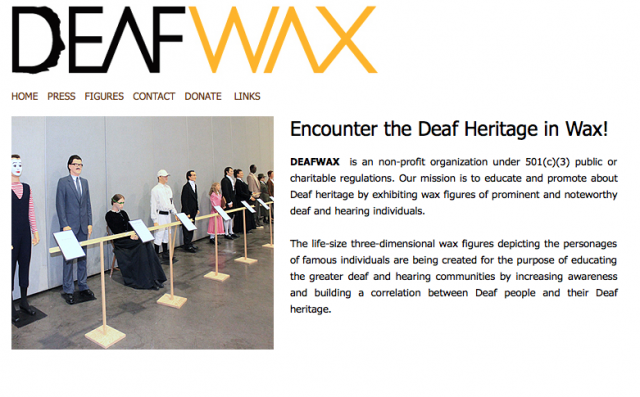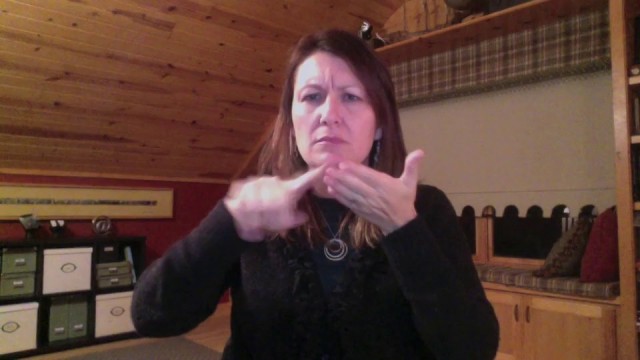Originally appeared in Silent News, January 2001.
On Nov. 30, I had the opportunity to take a scenic drive up to the Catskills Mountains to the Eastern Correctional Facility in Napanoch, N.Y. Eastern is a maximum security prison located inside of a beautiful castle-like building.
Peter Cook and his Flying Words project partner, Kenny Lerner, had been hired to do work with deaf inmates at the prison — about 20 of them — along with hearing inmates. Peter and I had discussed the possibility of my going with him and observing the workshop proceedings. However, two days before I was scheduled to go, I found out I hadn’t received the security clearance necessary to attend the workshops, but I could attend the performance that night.
I arrived a little early, so I stopped at some diner off Route 209. After having my usual diner grub, I decided to go ahead and arrive at the prison even though I was 45 minutes early. I sat in the lobby and waited. It was just like any state facility: old, standard linoleum floors, painted brick walls, and drab fluorescent lights.
Finally, Peter and everyone else arrived. We all got checked over by the guards, then walked down to the big auditorium that the performance was being held at. Peter and I discussed about how impressed we were with the size of the auditorium, and how we had mistakenly assumed we’d be in some stanky, small cafeteria room for the performance.
I came in that evening knowing that these inmates were rapists, robbers, murderers — all the people we love to hate in everyday society. These are the people who we read about in the newspapers or see on TV. I had also done some work with inmates in the past as a deaf interpreter. I expected the deaf inmates to be cliquish, rough, and hardened. I was actually a bit intimidated walking down to the auditorium, even though I was with a large group of people.
After a while, the deaf prisoners arrived. And this is where my preconceived notions crumbled away.
The inmates were so nice, so respectful. I was blown away by their desire to make me feel comfortable around them. Peter had filled me in on the three-day workshop, and I was anxious to see it all come together at the performance. There were some inmates that struck me with their individual characteristics.
Alejo, a hearing inmate who signed extremely well, struck me with his serene spirit. He was very friendly, very charming and looked very young. I gasped when he told me he had been in jail for 15 years and had about 3 years to go — and I thought to myself, how old could he possibly be?! This man looked so young, though the peaceful look in his eyes almost gave away his age. I also wondered to myself what crime he had committed, but didn’t dare ask (I wanted them to know that they could be viewed as the people they were, rather than as criminals). I later found out from doing a search on the web that he had committed murder in the second degree along with robbery, and that he was 38. This meant he had been in jail since the age of 23.
Robert, a 6’4″ deaf inmate jailed for robbery, anxiously told me about how he was being released on Valentine’s Day. One of the most outspoken and energetic members of the group, he appeared very intelligent and knowledgeable. He also mentioned a letter he and another inmate had written to Dear Stella a while ago.
David, a hearing inmate, kept running around making sure everyone had drinks and food during the intermission. He was bashful about his signing skills, and giggled when I complimented him on his efforts. David was so concerned about making sure everyone had gotten a large piece of the cake given out, and about keeping the floor and seats clean.
There were also Frank and Joseph who gave me copies of songs they had written, in hopes of finding deaf rap singers who could help them bring these songs to life.
I genuinely liked these inmates. I laughed and joked with them. At the same time, I kept thinking, “These people are supposed to be bad people, horrible people. They’re not supposed to have families and friends.” I also kept reminding myself that they broke the law, and some even caused others to lose their lives.
After the performance, a group of us went out to eat. Peter and I kept talking about how amazing this whole experience was — even more so for him having worked with them over three days. One thing we kept saying was, “They were so normal!” I told Peter I felt as if I had been at any deaf event, just chatting with them about everyday events. One of the prisoners even asked me, “Is it true some guy got killed at Gallaudet? That’s so sad!” and began an animated discussion with two other inmates about the terrible nature of the Plunkett murder.
And these are hard-core criminals we’re talking about.
It really confuses me that I could have compassion for these kind of criminals, because they were so…well, ordinary. They have victims who suffered from their crimes. And they’re paying their debt to society. But I actually walked away from this night rejuvenated, with hope. This was the first time I believed in the idea of programs like this actually affecting criminals. I’ve long scoffed at programs like this — thinking that our taxpayers’ money could be used better. But here I was: an everyday citizen, having been renewed by a group of criminals’ expressions.
I’ll end with a poem written by Alejo that appears in Voices Under The Harvest Moon, a collection of Eastern inmates’ poetry. This poem now hangs on the wall in my office.
Sing Sing Sits Up The River
How alive,
the rhythm that waves move at,
it’s as though they’re breathing,
in and out,
like seasons change, nature
itself inhales and exhales a spirit
that air too breathes
almost human and kind,
how the wind comes to visit me,
blowing past curls of razor wire.
Rows & rows of it – razors
wrapped around the top of
electronically juiced fences
intended to shock
until they kill.
Yet the wind still has not abandoned our visits,
even after having been cut a million times,
the wind bleeds, we become blood brothers
How humane and touching
That the bars feel the openness,
the freedom outside, the space beyond
the other side of where I stand – Upstate New York.
Where underground railroads once ran & ran
cold, tired & hungry in the night
but can’t stop
gotta keep movin’
gotta get to a Black freedom
where now prisons are built in the hills,
how thoughtful.
How sparrows still remind me there’s a spirit
free. And that it breathes.
Even where winters are the coldest
& holidays are just a thing from
another life.
Even in this cold that burns,
the sun still kisses my forehead
as if I were as pure
as a day breastfeeding in my mother’s arms.
How unimaginable,
how freedom comes alive
Touching the sun
between bars.
–Alejo Dao’ud Rodriguez
Copyrighted material. This article can not be copied, reproduced, or redistributed without the written consent of the author.


